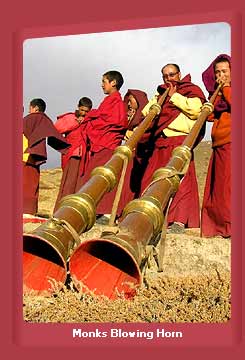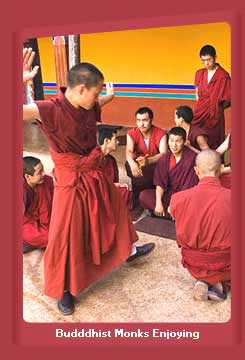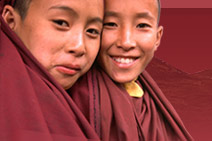
Religion in Tibet - Buddhism in Tibet
Buddha means 'the enlightened one'. Sankyamuni (saviour of the sakya clan) is a title of respect for the man named Siddharta Gautama, who was born a prince in the north India around 500 B.C.. He grew up in luxury, shielded from contact with human misery, and married young,. One night curiosity led him outside, where he saw shocking examples of disease, old age and death. Determined to find a way to save mankind from suffering sakyamuni left his wife and child, renounced his princehood, and spent long long years wandering as an ascetic. At last, fasting and meditating under a tree, he received enlightenment.Buddha's insight into ultimate reality was embodied in the four noble truths and the eightfold path. He wished to be a guide, not an authority, and early buddhism was a way of life rather than a religion. Its teaching encouraged people to take full responsibility for their thoughts and actions and to progress along a path to spiritual growth.
Buddha's followers formed open communities of monks and nuns, who lived disciplined lives and sought wisdom, their prime virtue. For 500 years, while buddhism spread throughout India, all teaching was oral. In the third century B.C. this early form of Buddhism in India, called theravada, took root in ceylon and spread onto other parts of south and southeast Asia.
 In
the north, a new form of Buddhism appeared, called mahayana or the greater
vehicle, which appealed to many more people. Though sharing basic doctrines
with hinayana (thervada), its emphasis changed. Compassion was its chief
virtue, and its ideal was the bodhisattva, a perfected individual who gave
up release from the cycle of rebirth in order to return to earth and help
all sentient beings. Buddha was now treated like a god. Countless mythical
Buddhas were invented to embody all of his aspects, and their images were
worshipped in temples. By the first century ad, scriptures, called sutras,
laid down doctrines and monastic rules and recorded Buddha's sermons as they
were remembered. Mahayana Buddhism spread to central Asia, china, Korea and
japan.
In
the north, a new form of Buddhism appeared, called mahayana or the greater
vehicle, which appealed to many more people. Though sharing basic doctrines
with hinayana (thervada), its emphasis changed. Compassion was its chief
virtue, and its ideal was the bodhisattva, a perfected individual who gave
up release from the cycle of rebirth in order to return to earth and help
all sentient beings. Buddha was now treated like a god. Countless mythical
Buddhas were invented to embody all of his aspects, and their images were
worshipped in temples. By the first century ad, scriptures, called sutras,
laid down doctrines and monastic rules and recorded Buddha's sermons as they
were remembered. Mahayana Buddhism spread to central Asia, china, Korea and
japan.A third type of Buddhism saw man's harmony with the universe as the key to salvation. Adepts of tantrism in India tried to manipulate external forces by magic, while followers of chan in china induced inner harmony through meditation.
Buddhism died out in India around 1200, as Hinduism revived and harsh moslem invasions destroyed Buddhist centres. But Buddhist doctrines and scriptures lived on in Tibet, where Buddhism was promoted by the kings. The faith almost vanished with the end of the monarchy in the ninth century. When it arose again, Tibet's decentralized conditions allowed Buddhism to split into some 20 sects.
The following five became the most important:
Nyingmapa
The ancient ones, began around 750 ad with padmasambhava. It absorbed the bon faith and produced the Tibetan book of the dead.
Kahdampa
Began with atisha after 1050 ad. Its tradition laid stress on the scriptures and discipline, and it formed a link with India's sages.
Kagyupa
Began around 1060 ad with the teachers of marpa and milarepa. Most typically Tibetan, it stressed yoga as the way to seek enlightenment.
Sakyupa
It arose in 1073 ad at sakya monastery, which later governed Tibet. It was worldly and practical in outlook, less concerned with metaphysics.
Gelugpa
The virtuous ones or yellow hats, began with tsong khapa in 1407 ad. It absorbed kahdampa and carried on atisha's tradition. It dominated Tibet after the 17th century, leaving other sects to play a minor role.










